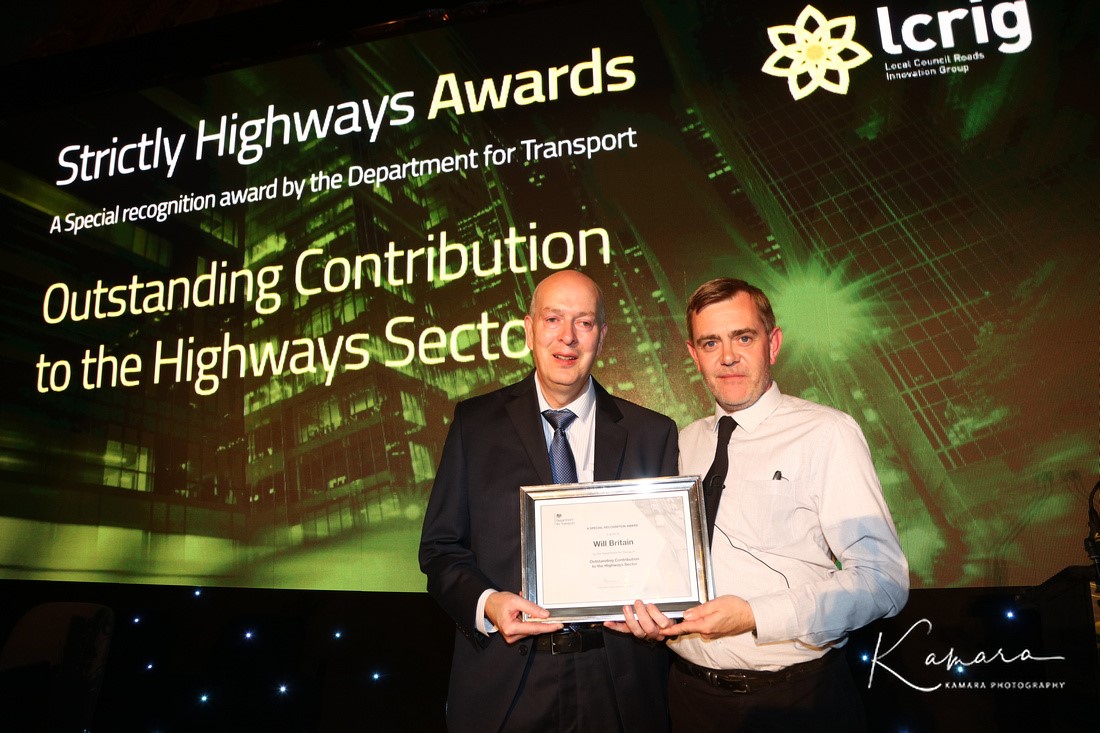Will Britain has been president of the Local Council Roads Innovation Group (LCRIG) since the organisation’s formation in 2013. Here, he discusses the group's journey to where it is today, how he has used his own career experience to help overcome challenges and the importance of removing barriers to change.

The foundations of LCRIG
LCRIG now works with the highways sector to deliver positive change on a national level, including the development of innovative techniques that save money, increase efficiency and ensure road users always have access to excellent highway services.
To date, LCRIG has over 70 local council highway authorities as members and over 75 associate members, which are the key to the success of the LCRIG business model. We value the commitment and support from each of our associate, consultant and utility members.
As president of LCRIG, I was honoured to be awarded a Special Recognition Award by the Department for Transport (DfT) for Outstanding Contribution to the Highway Sector in September 2019.
I started work for Blackpool Council in 1979 as a junior technician. I was lucky enough to be sponsored to gain a B.Eng. Hons degree in Civil Engineering and then trained in most of the municipal engineering themes as part of my ICE Chartered status.
In 2002, I became fully responsible for the highways asset management service. Using my previous experience of developing business cases I started to formulate my initial vision to elevate the status of highways to empower elected members with the information needed to decide the future of the road network for the next generation.
To do this, I needed to secure the correct level of funding for the future of Blackpool’s roads.
I started to collaborate with other local councils to investigate what common problems existed. It became apparent that very heavyweight systems were being used to calculate Best Value Performance Indicators (BVPIs) and these were required at that time for the DfT’s vast range of BVPIs.
Picture: Will hard at work in the 1990s, (before they invented ties of fewer than four colours).

I was disappointed to see that systems developed to assess road condition were confusing, to say the least, and sometimes very inaccurate. To overcome this problem, I decided to become trained as a UKPMS super user. I tried several times to win the support of financial officers and presented to the executive committees intending to influence higher investment in highways.
Following some failed attempts, I decided to develop the ‘thinking’ of helping the layperson understand where, why and when investment is required when considering road asset condition.
In 2009 I arranged my first conference in Blackpool which was attended by 15 local council highway departments. As I was interested in systems thinking I used this approach to describe the problems with data as being the theme for this conference.
During this event, I described how and why the usual way of doing things was based on performance with a system that was confusing and not easy to understand providing varying condition ratings and no confidence in the output.
Proving the case
The year 2009 was the most important in my career as it set the scene for the future of why LCRIG was formed.
I was responsible for producing a business case to the DfT to challenge the ‘traditional’ transport condition survey/monitoring systems and highlight how emerging innovative technologies can add enormous value and allow much more visual interpretation.
Blackpool Council received the largest Element 2 Grant Funding (£600,000) throughout all UK council highway authorities.
I was responsible for developing and introducing a new innovative treatment-based survey and worked in partnership with York University’s Knowledge Transfer Partnership (KTP) to use local data to quantify the underlying patterns of deterioration and failure risk on carriageways and footways.
I used this to introduce and establish an asset management framework to lead the Blackpool Council senior management and elected members through a major gap analysis in understanding the root cause of the difficulties Blackpool had to face in the past, by arguing the case for increased highway maintenance budgets, whilst attempting to deliver sound and efficient asset management processes and enabling a vision for the future.
This delivered a cultural change that led to the implementation of Project 30 where Blackpool Council prudentially borrowed £30m to invest in the highway network.
Project 30 and the launch of LCHIG
I was determined to extend the learnings of Project 30 and in 2012 I initiated a group of local councils who were extremely interested in this new approach. I called this group the Local Council Highways Investment Group (LCHIG) as this was the fundamental strategy that was being developed. I witnessed fantastic engagement through this group which had grown to 11 councils.
I developed the RAMS Framework Contract, which is available to every council highway authority in the UK including the DfT.
It has now been utilised by over 40 councils, with the complete ‘buy in’ from elected members and it had by 2014 successfully accounted for over £500m invested in the UK’s highway network. Between 2013 and 2016 LCHIG continued to grow and in 2017 I renamed the group Local Council Roads Innovation Group (LCRIG).
I arranged the first national LCRIG conference in 2018, which was attended by over 70 local councils. LCRIG then held further technical training days which were also taken up by many councils.
Picture: Will being presented with his DfT Special Recognition Award by the late, great Steve Berry, who was a strong supporter of LCRIG.

Helping SMEs and Tier 1 contractors
Following this success, I listened to many experienced SMEs telling me that they were desperate to spread their innovations but were locked down by the market.
This had to be a key objective of LCRIG as the involvement of the supply chain would provide
a step-change going forward. I wanted to engage with all UK councils and LCRIG needed to provide a ‘conduit’ to encourage them to work together and with the ‘highways community’ to support the DfT to deliver innovation on a national level, as well as using innovations from the local SME level. This is now the LCRIG model.
Firstly, I knew that from all my experiences with collaboration (as I have met and collaborated with over 90 councils in my journey) that all council officers when talking or communicating to each other have this unique trust and confidence between them. This is a unique aspect of council officers who are more confident and therefore more likely to use something new when recommended by another council.
Another key element to making the group sustainable was to maintain a very small client base with a board, and use existing resources across the UK who represent the highways sector.
Then to demonstrate that any council could become a member, I required a signed declaration from the Portfolio Holder / Leader to demonstrate the commitment from the council in support of LCRIG’s requests and to return the LCRIG promise.
The next step for LCRIG is to ensure that innovation is not done in isolation or silos but communicated and encouraged throughout the sector. When LCRIG was established I developed a set of principles that we wanted all members to adhere to known as the ‘9 Commitments’. These principles remain as relevant today as they were in 2013 and guide the actions of all members.
It is time for all council members to follow the LCRIG principles. A key objective of ours is to embed innovation. If local councils have done something in isolation, then it is of more value if this is shared across the sector. LCRIG does not just want to disseminate innovation but embed it. LCRIG’s model is free for local councils but there is a promise to SMEs that their efforts will not go unnoticed.
The future for LCRIG
Under the clouds of recession, is it possible that research and development are forced to take a back seat in that delivery chain? You will always have traditionalists who are not open to new ideas. Failure of uptake of new technologies is not down to the providers, SMEs or entrepreneurs, but it is the fault of openness, and communication.
Sometimes a traditionalist wants to undermine success and new developments and create barriers of resistance to change. If we followed their ideology that nothing must change then we would be at a complete standstill and not have the benefits of cleaner and smarter cities.
Perhaps we as a sector should blow our own trumpet more. If we could explain and articulate more fully and simply then the highways sector would be even more successful and receive more resources and funding. Our world is not going to get any less technological and highways sector technology will keep us at the forefront of global development.
Ultimately, it will provide prosperity and improve everyone’s lives and protect the planet by playing its part in reducing carbon emissions.





